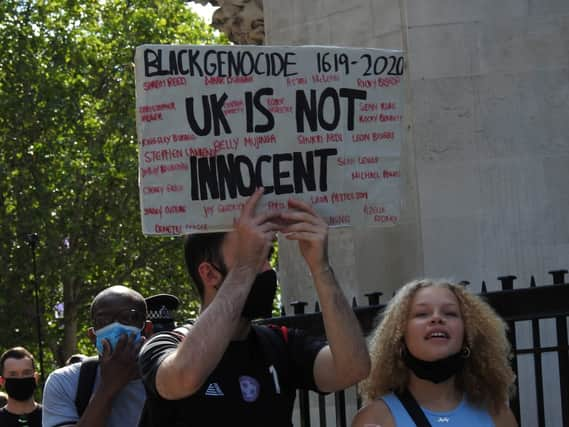1 in 8 UK residents believe black people are more likely to be unemployed because they 'lack motivation or willpower'


A survey of 2,000 UK residents has revealed stark views on inequality in the UK, with a significant number expressing negative views on ethnic minorities.
The findings have come from a report - titled 'Unequal Britain' - from King's College London, where researchers polled a representative sample of the public on their attitudes around inequalities and the coronavirus pandemic.
Advertisement
Hide AdAdvertisement
Hide AdOne of the headline findings was that nearly half (47 per cent) of those surveyed believe those who had lost their job during the coronavirus crisis were likely to have been underperforming at work.
The authors of the study say that their findings revealed “meritocratic and individualistic tendencies" among the public, with a "strong belief in meritocracy in Britain – that hard work and ambition remain key drivers of success, and this colours views, even during a pandemic".
In findings that will raise fears over inequalities across the country, the survey also discovered a significant prevalence of negative attitudes towards ethnic minorities, with one in eight (13 per cent) stating that the reason for black people having lower earnings and higher rates of unemployment is down to a lack of motivation or willpower.
Conservative and Brexit voters (both 21 per cent) were significantly more likely to hold this belief, with four per cent of Labour voters and six per cent of remain voters holding this same belief.
Advertisement
Hide AdAdvertisement
Hide AdJust under half of those surveyed (47 per cent) said that discrimination against black people helped to explain why this ethnic group have lower earnings.
The researchers also discovered strikingly racist views among four per cent of those surveyed, who said inequalities among black people were down to “less in-born ability to learn”.
Racial and gender inequality not a priority
Those polled were more likely to care about inequalities between geographical areas than inequalities between genders, races and generations, with geographical inequality rated the most significant by the largest number of people. This was followed by wealth and income.
Less than half of people put racial differences in their top three or four most serious inequalities, while less than a third included gender.
Advertisement
Hide AdAdvertisement
Hide AdIn spite of growing evidence of an adverse impact on women in the workforce as a result of coronavirus, a third of people said they wouldn't consider increased gender inequality as a result of coronavirus to be a problem.
“These findings underline all too clearly the increased importance of place in debates about politics in general and inequality in particular,” Prof Anand Menon, director of the UK in a Changing Europe, which collaborated in the study, told The Guardian.
“The government should view this emergent consensus as providing a window of opportunity to act on the ambitious promises it has made to ‘level up’ the country.”